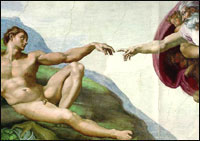religion and spirituality
-
Is there tension between them?
I am an atheist.
I wouldn't call myself a "militant" atheist, as I don't consider being an atheist a big part of my life or my self-image. I don't believe there are furry three-eyed ghosts floating behind me at all times, but I don't get militant about that either. Why bother?
However, in these times we live in, there's a strange pressure to show extreme deference to religious proclamations, however expressed, no matter how absurd the content. Witness, for instance, the global media lovefest when the pope died, during which I read a quote from a bishop who said, "papal infallibility doesn't mean you get it right every time." Oh? Gosh, that sounds kinda dumb to me. But I'm not allowed to say so.
I'm allowed to say that I have a "difference of values" with far-right religious folks about homosexuality, but I'm not allowed to say that finding justification for discrimination in a millennia-old Jewish holy book is %$@#! stupid and irrational.
But whatever. Most of the time, I can live with this -- I reside in a secularist blue-state bubble anyway, and I figure the current wave of backwards medieval religious sentiment will pass in due time. Live and let live, I say.
But Richard Dawkins, author of celebrated evolution masterwork The Selfish Gene, does not share my attitude. He shows no deference and hedges no bets. This interview with Dawkins in Salon is, in that way, utterly refreshing. It reminds you how few people, despite the perpetual delusions of persecution on the part of modern-day right evangelicals, are willing to openly criticize the religious -- despite their complete lack of restraint in criticizing us atheists.
My point? Glad you asked. The one thing I would ding Dawkins for is this exchange:
-
Evangelical enviros leery of associating with, uh, enviros
Richard Cizik, head of the National Association of Evangelicals, is heavily hawking the notion of "creation care" these days. (That would be God-flavored environmentalism, for those not in the know.)
Three weeks ago, he chatted up the concept with NPR's Scott Simon (whom I wholly adore, but that's a topic for another post).
This past weekend, he got his mug and his pitch in The New York Times Magazine, via a Q&A with Deborah Solomon. An excerpt:
Q: What is wrong with [the] term [environmentalism]?
The evangelicals don't want to play with the enviros, and -- sad, but true -- that's probably smart strategizing. The Christian right already knows how to get Bush's attention, and Rove's devotion. Can any green groups say the same?A: It's not the term. It's the environmentalists themselves. I was recently speaking with the leadership of the Sierra Club and the National Wildlife Federation, and I told them, ''Gentlemen, I respect you, but at this point don't plan on any formal collaborations.''
Q: Why? Because they lean to the left?
A: Environmentalists have a bad reputation among evangelical Christians for four reasons. One, they rely on big-government solutions. Two, their alliance with population-control movements. Three, they keep kooky religious company.
Q: What is your idea of a kooky religion?
A: Some environmentalists are pantheists who believe creation itself is holy, not the Creator.
Q: And what's No. 4?
A: There's a certain gloom and doom about environmentalists. They tend to prophecies of doom that don't happen. Look at the movie "The Day After Tomorrow," in which New York City freezes over.
-
Evangelicals
Glenn Scherer's much-cited piece "The Godly Must Be Crazy," which argued that far-right Christian evangelicals are hostile to environmental protection, is apparently not the end of the story. The Washington Post's Blaine Harden finds evidence that evangelicals are going green. Joel Makower discusses the issue, as does the Progressive Blog Alliance. Sustainablog also points us to more info at Harvard's Forum on Religion and the Environment and Rev. Larry Rice's essay "As the Giant Sleeps ... Creation Suffers."
This strikes me as a subject in dire need of some empirical -- as opposed to anecdotal -- research. Just how many evangelicals are the raving End Timers Glenn describes and how many the "creation care" types Harden describes? There's an anthropological flavor to a lot of this reportage, which just goes to show how poorly understood the evangelical community is, particularly in light of their extraordinary political influence.
-
Evangelicals and the earth
Grist, of course, ran the definitive story on the Christian right's relationship to environmentalism, but it wouldn't hurt to go gather additional insights from this piece by Alexander Zaitchik. He asks, "If a slowly expanding majority of evangelical Christians in this country supports the regulation of industry to protect the environment, and if there is no clear Biblical injunction against doing so, why are the most vehement anti-environmentalists in American politics consistently found among the Christian Right?" If you guessed "close ties between the movement's national leadership and industry," well, give yourself a gold star.
-
Umbra on Christmas trees
Dear Umbra, Please settle our office dispute. Which is better for the environment: real or fake Christmas trees? Some believe that cutting down juvenile trees, displaying them for two weeks, then throwing them in the garbage is destructive, wasteful, and highly unfriendly to the environment. Others say that the Christmas-tree business keeps land that would […]
-
Christian-right views are swaying politicians and threatening the environment
A kind of secular apocalyptic sensibility pervades much contemporary writing about our current world. Many books about environmental dangers, whether it be the ozone layer, or global warming or pollution of the air or water, or population explosion, are cast in an apocalyptic mold. – Historian Paul Boyer When he opened the sixth seal, I […]
-
At 70, Wendell Berry remains a champion of agrarian ideals
Wendell Berry, right at home. Wendell Berry, 70 years old today, has established himself as many things in his lifetime: a veteran sage of sustainable agriculture; a progressive defender of virtue and tradition; one of our most famous farmers to renounce the tractor; and one of our most acclaimed authors to shun the computer. To […]
-
Jonna Higgins-Freese reviews Reinventing Eden by Carolyn Merchant
In Reinventing Eden: The Fate of Nature in Western Culture, Carolyn Merchant, an environmental historian at the University of California at Berkeley, analyzes how one religious theme -- the Christian interpretation of the Genesis story -- has shaped worldviews through history, both mainstream Western views and environmental thinking. The book makes fascinating reading, and her insights might help environmentalists frame more effective messages for the public at large.
-
Umbra on candles
Dear Umbra, Recently, nature-conscious religions such as Paganism and Wicca are getting a lot of attention. This is a mixed blessing. On the one hand, such religions inspire love for the environment and have spawned many eco-nuts (myself included, I admit). However, although most of the common practices seem to be eco-friendly enough, I’m concerned […]


